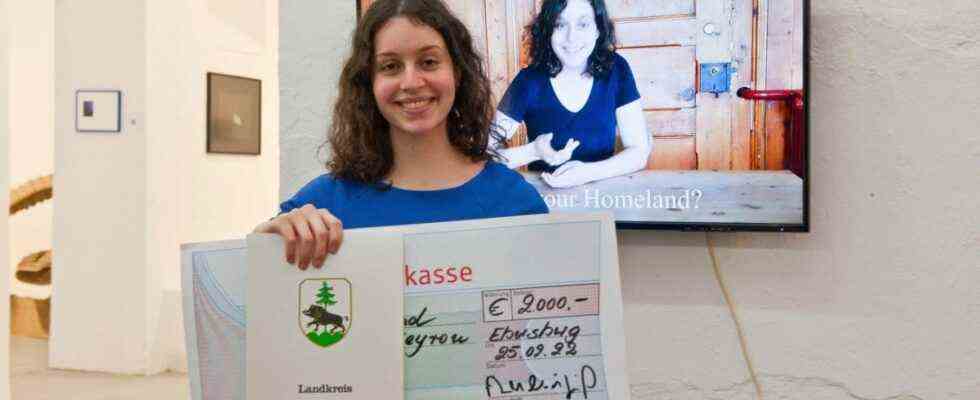In the annual exhibition of the Ebersberger Kunstverein, which opened on Friday, there are actually quite a few prize-worthy exhibits. In this respect, it was probably anything but easy for the jury to choose a winner. But the art prize of the Ebersberg district can only go to one of the exhibitors – and now it’s clear: this year’s prizewinner is Sarai Meyron. She submitted a short video for the exhibition on the topic “The State of Things”. The title of it is a question: “Where do you come from?” This is the second time that this work has received an award, it has already won in the film category at the Willi Münzenberg art competition, which aims to promote young artists who are critical of society.
Like many of the artists exhibiting in Ebersberg, Sarai Meyron does not come from the district. The 26-year-old lives in Braunschweig and became aware of the Kunstverein’s call for tenders via the Internet. With her work, the artist interprets “the state of affairs”, the motto of the exhibition, as something that not only depends on the present, but also on the past. “Because this influences what we do and do now,” she says.
The visual language of the video is unspectacular: you see Sarai Meyron sitting at a table, facing the viewer, so to speak. In the background a wooden door, like in an old Bavarian house. There is no scene change. But the young artist asks the viewer a lot of questions, including about his origins.
Sarai Meyron herself is Jewish, born in Israel, and spent eight years of her childhood in America. Her grandmother was Bavarian, her father is from Iraq. At the time the video was made, she was new to Germany and spoke with an accent. The 26-year-old explains that she noticed this while working in a traditional German restaurant, which is why she was repeatedly asked many questions. So she soon saw herself as a kind of “ambassador for foreigners” in Germany. She was often confronted with the same question several times a day – “but you could tell that some people didn’t mean well.”
These questions from the tavern – for example “Where are you from?”, “What is your mother tongue?”, or “Why did you come to Germany?” – the artist now directs her video to the viewer. Some questions give you a good feeling and almost make you want to give an answer. With others, however, the opposite happens: they seem uncomfortable, a bit like an invasion of privacy. This difference is also made clear by the fact that Meyron asks some questions several times, just in different formulations.
The origin, or past, is an important part of the identity of every human being. And this topic not only characterizes Meyron’s video, but her entire work, for example the book she is currently working on. She calls her own origins a “mixed identity” – it’s something very modern and can trigger a feeling of alienation, she says. In any case, it is difficult for her to answer the question “Where are you from?” to answer, the artist says, since she sees herself as an American but does not have an American passport. And when she answers that she comes from Germany, that’s true, but she feels just as connected to Iraq. The artist asks herself the questions from the video in search of her own identity.

